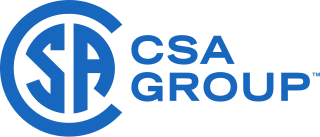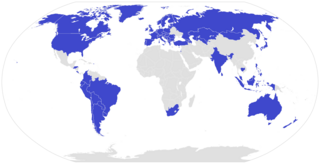Related Research Articles
Professional certification, trade certification, or professional designation, often called simply certification or qualification, is a designation earned by a person to assure qualification to perform a job or task. Not all certifications that use post-nominal letters are an acknowledgement of educational achievement, or an agency appointed to safeguard the public interest.
The ISO 9000 family is a set of five quality management systems (QMS) standards that help organizations ensure they meet customer and other stakeholder needs within statutory and regulatory requirements related to a product or service. ISO 9000 deals with the fundamentals of QMS, including the seven quality management principles that underlie the family of standards. ISO 9001 deals with the requirements that organizations wishing to meet the standard must fulfill. ISO 9002 is a model for quality assurance in production and installation. ISO 9003 for quality assurance in final inspection and test. ISO 9004 gives guidance on achieving sustained organizational success.
A nutritionist is a person who advises others on matters of food and nutrition and their impacts on health. Some people specialize in particular areas, such as sports nutrition, public health, or animal nutrition, among other disciplines. In many countries, a person can claim to be a nutritionist even without any training, education, or professional license, in contrast to a dietitian, who has a university degree, professional license, and certification for professional practice.

Occupational hygiene is the anticipation, recognition, evaluation, control, and confirmation (ARECC) of protection from risks associated with exposures to hazards in, or arising from, the workplace that may result in injury, illness, impairment, or affect the well-being of workers and members of the community. These hazards or stressors are typically divided into the categories biological, chemical, physical, ergonomic and psychosocial. The risk of a health effect from a given stressor is a function of the hazard multiplied by the exposure to the individual or group. For chemicals, the hazard can be understood by the dose response profile most often based on toxicological studies or models. Occupational hygienists work closely with toxicologists for understanding chemical hazards, physicists for physical hazards, and physicians and microbiologists for biological hazards. Environmental and occupational hygienists are considered experts in exposure science and exposure risk management. Depending on an individual's type of job, a hygienist will apply their exposure science expertise for the protection of workers, consumers and/or communities.

The CSA Group is a standards organization which develops standards in 57 areas. CSA publishes standards in print and electronic form, and provides training and advisory services. CSA is composed of representatives from industry, government, and consumer groups.
A medical assistant, also known as a "clinical assistant" or healthcare assistant in the USA is an allied health professional who supports the work of physicians, nurse practitioners, physician assistants and other health professionals, usually in a clinic setting. Medical assistants can become certified through an accredited program. Medical assistants perform routine tasks and procedures in a medical clinic.

Certification is part of Testing, inspection and certification and the provision by an independent body of written assurance that the product, service or system in question meets specific requirements. It is the formal attestation or confirmation of certain characteristics of an object, person, or organization. This confirmation is often, but not always, provided by some form of external review, education, assessment, or audit. Accreditation is a specific organization's process of certification. According to the U.S. National Council on Measurement in Education, a certification test is a credentialing test used to determine whether individuals are knowledgeable enough in a given occupational area to be labeled "competent to practice" in that area.
Nursing credentials and certifications are the various credentials and certifications that a person must have to practice nursing legally. Nurses' postnominal letters reflect their credentials—that is, their achievements in nursing education, licensure, certification, and fellowship. The letters usually appear in the following order:

The Chartered Quality Institute (CQI), formerly known as The Institute of Quality Assurance (IQA), is the chartered body for quality professionals. It improves the performance of organisations by developing their capability in quality management. As a registered charity, the CQI exists to advance education in, knowledge of and the practice of quality in the industry, the public sector and the voluntary sectors.
The Institution of Occupational Safety and Health (IOSH) is a global organisation for health and safety professionals, based in UK.

The British Standards Institution (BSI) is the national standards body of the United Kingdom. BSI produces technical standards on a wide range of products and services and also supplies certification and standards-related services to businesses.
The Certified Safety Professional is a certification offered by the Board of Certified Safety Professionals. The accreditation is used in the United States by the National Commission for Certifying Agencies and internationally by the International Organization for Standardization/International Electrotechnical Commission and 193 Countries Consortium.
American Society of Safety Professionals (ASSP), formerly known as American Society of Safety Engineers (ASSE) until June 2018, is a global organization of more than 37,000 occupational safety and health (OSH) professional members who manage, supervise, research and consult on work-related OSH concerns in all industries, government and education. The Society's members use risk-based approaches to prevent workplace fatalities, injuries and illnesses.

The National Examination Board in Occupational Safety and Health is a UK-based examination board offering qualifications in health, safety, environment and wellbeing management.
OHSAS 18001, Occupational Health and Safety Assessment Series, was an international standard for occupational health and safety management systems that was subsequently adopted as a British Standard. Compliance with it enabled organizations to demonstrate that they had a system in place for occupational health and safety. BSI cancelled OHSAS 18001 to adopt ISO 45001. ISO 45001 was published in March 2018 by the International Organization for Standardization. Organizations that are certified to OHSAS 18001 were able to migrate to ISO 45001 by March 2021 to retain a recognized certification.

Occupational safety and health (OSH), also commonly referred to as occupational health and safety (OHS), occupational health, or occupational safety, is a multidisciplinary field concerned with the safety, health, and welfare of people at work. These terms also refer to the goals of this field, so their use in the sense of this article was originally an abbreviation of occupational safety and health program/department etc.
The Occupational Safety and Health Consultants Register (OSHCR) is a public register of UK-based occupational health and safety advice consultants, set up to assist UK employers and business owners with general advice on workplace health and safety issues. The register was established in response to the Government’s October 2010 report on 'Common Sense, Common Safety', which recommended that all health and safety consultants should be accredited to professional bodies and a web-based directory established.

ISO 45001 is an ISO standard for management systems of occupational health and safety (OHS), published in March 2018. The goal of ISO 45001 is the reduction of occupational injuries and diseases, including promoting and protecting physical and mental health.
The Canadian Registered Safety Professional (CRSP)/ Professionnel en sécurité agréé du Canada (PSAC) is a certification offered by the Board of Canadian Registered Safety Professionals for an Occupational Health and Safety professional. The CRSP/PSAC is accredited in Canada to ISO 17024 by the Standards Council of Canada.
Credentialing is the process of establishing the qualifications of licensed medical professionals and assessing their background and legitimacy.
References
- ↑ Standards Council of Canada Accreditation, May 28, 2014 Archived May 29, 2014, at the Wayback Machine
- ↑ The British Standards Institution (ISO) 9001 (BSI Group), June 2, 2014
- ↑ BCRSP Annual Report, July 25, 2014 Archived October 15, 2014, at the Wayback Machine
- ↑ Memoranda of Understanding (MOU) with the Board of Certified Safety Professionals (USA), May 20, 2014 Archived July 4, 2014, at the Wayback Machine
- ↑ , Memoranda of Understanding (MOU) with the Institute for Occupational Safety and Health, May 20, 2014
- ↑ Memoranda of Understanding (MOU) with the AIHS'
- ↑ Memoranda of Understanding (MOU) with NEBOSH
- ↑ Canadian Network of National Associations of Regulators(CNNAR) Membership, May 28, 2014
- ↑ https://www.inshpo.org/ [ bare URL ]
- ↑ "BCRSP and CSSE Establish Collaboration Agreement at 2014, May 5, 2014". Archived from the original on January 30, 2015. Retrieved August 17, 2014.